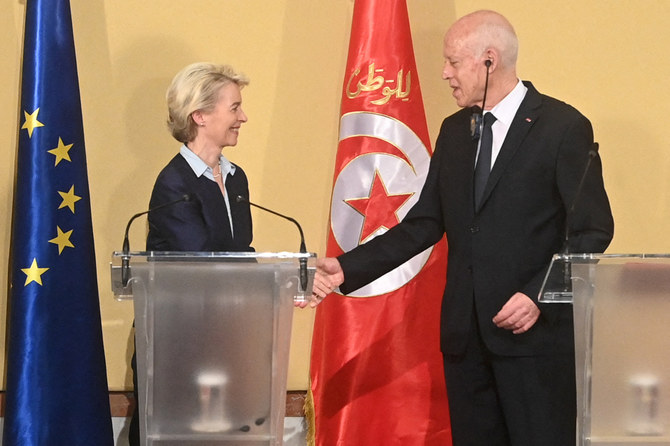LONDON: Tunisia has said it will not become a “reception center” for the return of sub-Saharan migrants from Europe despite the country signing a $1.1 billion deal with the EU.
The migration pact, signed on Sunday amid a visit to Tunisia by European Commission President Ursula von der Leyen, Italian Prime Minister Giorgia Meloni and Dutch Prime Minister Mark Rutte, will facilitate the return of thousands of Tunisian migrants and open legal routes for people to work in the EU, The Guardian reported on Monday.
But Tunisian authorities have stood firm over clauses relating to the return of non-citizen migrants who cross the Mediterranean Sea into Europe by way of Tunisia.
Last month, Meloni reached a significant compromise with the EU, potentially enabling member states to return migrants to their country of departure even if they had stayed in the country for only a few days.
But the clause could prove costly for Tunisia, which serves as a departure point for thousands of non-citizen migrants arriving from further south on the African continent.
Tunisian President Kais Saied had previously warned that his country would not act as the EU’s “border guard.”
An EU source told The Guardian: “That is a point on which the Tunisian authorities feel they have communicated this clearly — that they … shouldn’t be a reception point for irregular migrants generally coming from Europe.”
Between April and June this year, about 14,000 migrants arrived in the EU from Tunisia.
The migration pact will allocate $117 million to Tunisia to help the country combat people smuggling, while half of the total budget will be spent on contracts with humanitarian organizations to enable the return of deported migrants back to their home countries.
Tunisia has suffered from growing domestic tensions over its position as a departure point for migrants, with Saied previously accusing “hordes” of sub-Saharan Africans of facilitating demographic change in his country.
Locals have also grown frustrated with the growing number of migrants in Tunisia, with the government carrying out mass evictions and moving arrivals to outlying desert areas on the Algerian and Libyan borders.
Courtesy: arabnews







